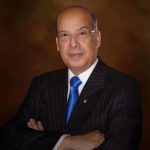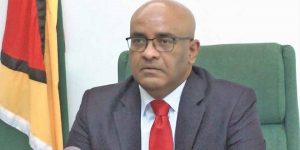
Dr. Sir Ronald Sanders former Caribbean diplomat
Guyana is in grave danger of being ostracised in the regional, hemispheric and global communities. As I write, the General Elections, which were held on March 2, still have no final count, and certainly not one that international observers have declared as credible, transparent and lawful.
I have seen many comments, statements and assertions from some who should know better, and those who seem to have adopted a herd mentality, that international approval is unnecessary and international disapproval, however demonstrated, is both unimportant and incapable of harming the country. Nothing could be further from reality.
Should the Guyana general elections be declared, and a government established, without the blessing of the international organisations that the Government invited to observe those elections, Guyana could face suspension from the Commonwealth and from the Organisation of American States (OAS) – two of the most important organisations to which it belongs, for breaches of the Commonwealth 1991 Harare Declaration on the protection and promotion of the fundamental political values of the Commonwealth, and the Inter-American Democratic Charter that guides the OAS.
Once the machinery of the Commonwealth and the OAS are invoked – as it certainly will be – suspension of Guyana from the councils of both organizations will assuredly follow. The European Union will also take separate action that will be directed at suspending normal terms of trade, aid and investment relations. The latter will have an immediate effect that will be immediately apparent in Guyana.
Of great significance is that both the Commonwealth and the OAS Observer missions were led by two former Caribbean Prime Ministers, Owen Arthur of Barbados and Bruce Golding of Jamaica. Therefore, those who look to racism to blame for positions of these organisations that don’t suit them, are hardly able to do so in this case.
And, those who might say that suspension of Guyana from the Councils of the OAS and the Commonwealth is of no account, it is worth reminding that these two Organizations have been extremely important to Guyana in defence of its sovereignty and territorial integrity in face of claims by Venezuela. When Guyana does not have a voice in these organisations, it is in no position to argue its case and to secure the support it has received in the past.
Note should be taken that, in the OAS, the ostensible representative of Venezuela is Juan Guaidó’s nominee, and the opposition in Venezuela has been especially virulent in its claim to two-thirds of Guyana. Therefore, in the OAS, Guyana will have left the OAS field clear for the Venezuela opposition to sow its seeds.
Similarly, if the Guyana elections are condemned by the international community, Guyana’s high moral standing in its case against Venezuela at the International Court of Justice, on the border contention, will be weakened.

Opposition leader, Bharat Jagdeo. Photo courtesy https://icdn.today/
Based on the recommendations of the Commonwealth Ministerial Action Group and the OAS Permanent Council, members of the 55 nation Commonwealth and the 34 nation OAS will be strengthened in taking any individual actions against Guyana that they consider appropriate. Mike Pompeo, the U.S. Secretary of State, has already said that “individuals who seek to benefit from electoral fraud and form illegitimate governments/regimes will be subject to a variety of serious consequences from the United States”. That is usually a first step before the U.S. unleashes sanctions against the operations of state-owned companies and their operations. Guyana would be hurt by actions taken against individual states from the EU, the Commonwealth and the OAS.
Sadly, the Caribbean Community (CARICOM) countries – 12 in the Commonwealth and 14 in the OAS – that would normally defend and fight for the interests of Guyana, as they have consistently done in the past, will be estopped from doing so by the shabby treatment accorded to CARICOM in its attempt to help to resolve the general elections process at the request of both President Granger and Opposition Leader, Bharat Jagdeo.
Current CARICOM Chair, Mia Mottley, the Prime Minister of Barbados, led a high-level team to Guyana of four other Prime Ministers that included three of the longest-serving leaders, Dr Ralph Gonsalves of St Vincent and the Grenadines, Dr Keith Mitchell of Grenada, Roosevelt Skerrit of Dominica and Dr Keith Rowley of Trinidad and Tobago, Guyana’s immediate CARICOM neighbour. In good faith, the leaders thought they had brokered an agreement with President David Granger and Opposition leader, Bharat Jagdeo.
Essentially, it was agreed that the tabulation process had been widely viewed as not being transparent or credible, and CARICOM was invited to supervise a recount as an independent body and one that wanted Guyana to come out of the situation, boasting legitimacy of the electoral process.
A CARICOM team, dispatched to supervise tabulation of the votes on March 15, was forced to leave the country after three days of patiently waiting in vain. Mottley was compelled to conclude that, despite CARICOM’s valiant efforts, “It is clear that there are forces that do not want to see the votes recounted for whatever reason”. She did not end there, she pointedly added: “Any Government which is sworn in without a credible and fully transparent vote count process would lack legitimacy”.
So, there is now the matter of what CARICOM will do. Given all these circumstances, it is unlikely to be business as usual with a government, established on the back of elections that are not deemed credible and transparent by any of the international Observers, including CARICOM. Even the continuation of the CARICOM Secretariat in Guyana could come into question.
No one in CARICOM wishes this fate for Guyana. At a moment in history when Guyana’s fortunes are set to be transformed by the exploration of oil and gas, all in CARICOM were looking forward to a vibrant Guyana, taking-up the leadership role it played in the Community’s original formation.
By the time this commentary is published in some places (it was written on 19 March), measures may have been taken to take the action necessary to tabulate the votes in Guyana through a transparent and credible process – with CARICOM re-invited to supervise it.
If that happens, Guyana will enjoy international respect amid its new-found wealth; if it doesn’t, the path ahead will be strewn with difficulties and hardships.
(The writer is Ambassador of Antigua and Barbuda to the United States and the Organization of American States. He is also a Senior Fellow at the Institute of Commonwealth Studies at the University of London and at Massey College in the University of Toronto. The views expressed are entirely his own)
Responses and previous commentaries: www.sirronaldsanders.com


